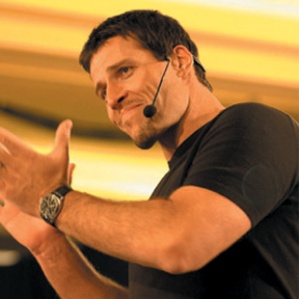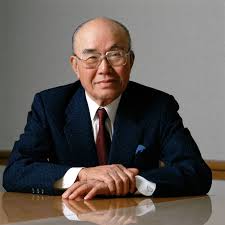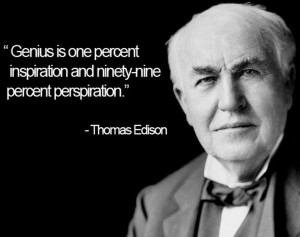 Is it possible, for a “loser” to become an “achiever”?
Is it possible, for a “loser” to become an “achiever”?
In 1995, I bumped into “Awaken the giant within”, a bestseller by Anthony Robbins.
Believe it or not, this book changed my life for ever. Non precisely when I finished to read it, but in the years to come.
I perfectly remember those days. At the time, I was living in England in order to complete a course of study regarding the English language.
When I started reading that book, I certainly was a “loser”.
I had already turned 30 and was still looking for my life’s path. I didn’t know who I was and for what reason I showed up in this world. I was feeling lost: my life was meaningless, my results bad, my mind confused, my expectations disappointed, my relationships poor. The main problem was that I had no direction, no goals, no vision, no mission at all.
After graduating in Economics in 1989, I had been working for some years as a controller in a big company until one day I woke up and asked myself: “What the hell am I doing here? Do I really want to work as an accountant for your entire life?”
The answer was no. I didn’t know what to do, but I was certain I didn’t want to spend all my life in that sad office totally absorbed by arid numbers. Thus, I resigned and flew to England to improve my English.
One day, I entered a bookshop in London and found this book by Anthony Robbins. I bought it and started to read it soon.
In the second page (actually the exact page number is 20) Anthony writes: One mother introduced me to her son who had been labelled “hyperactive” and “learning disabled”. Utilizing the principles of state management taught in this book, she was not only able to get him off the drug Ritalin, but they had also since been transferred to California where her son had been retested and evaluated at the level of genius! You should have seen his face as she shared with me his new label.
The author is here telling us his personal story. The story of a man who, eight years earlier, was struggling, frustrated, feeling alone and incapable of making his life work. Fat, broke and wondering if he could even survive. The story of a loser who was able to become an achiever. Yes, for Anthony Robbins, it was possible to change his destiny altogether. And the same happened to thousands of people who have attended his seminars so far. So, why shouldn’t be the same for all “losers”?
As well as Robbins when he was a loser, I too was feeling that my disappointing results didn’t express my true potential and that inside my life there was a jewel which I needed to find at all costs. I truly believe we all have a sleeping giant within us. Each of us has a talent, a gift, our own bit of genius just waiting to be tapped. You have no idea how excited I felt when I was reading these first rows.
The second chapter of Robbins’ book is about Making Decisions. The author writes that it’s in our moments of decision that our destiny is shaped and invites us to look back over the last 10 years with this questions in mind: Were there times when a different decision would have made your life radically different from today, either for better or for worse? How are you going to live the next 10 years of your life? How are going to live today in order to create the tomorrow you are committed to? We’ve got to set a baseline standard for what we’ll accept in our life, we’ve got to decide once and for all to make our life consistent with the quality of our spirit and achieve the destiny we want for our life to be meaningful.
But it was when I read the story of Ed Robert (page 37) that I felt change and commitment coming from within.
This men has been paralyzed from the neck down since he was fourteen years old. He uses a breathing device and he spends every night in an iron lung. Having fought a battle against polio, several times almost losing his life, he certainly could have decided to focus on his own pain, but instead chose to make a difference for others. For the last 15 years, his decision to fight against a world he often found condescending has resulted in many enhancements to the quality of life for the disabled. Facing a multitude of myths about the capabilities of the physically challenged, Ed educated the public and initiated everything from wheelchair access ramps and special parking spaces to grab bars. He became the first quadriplegic to graduate from Berkeley, and he eventually held the position of director of the California State Department of Rehabilitation, again pioneering this position for the disabled. Ed Roberts is powerful evidence that it’s not where you start out but the decisions you make about where you’re determined to end up that matter. All of your actions were founded in a single, powerful, committed moment of decision. What could you do with your life if you really decided to?
I stopped reading. I started thinking and realized that: a) I had probably been a loser hitherto, but this didn’t mean I had necessarily to be a loser for ever; b) I was in good health, I had a degree and was able to speak good English; c) I had been wasting time in things, jobs and activities I didn’t like at all and I had no precise direction to follow, but I could make a decision that might have shaped a satisfying destiny.
Thus, I started to think about what sort of decision would have shaped my life for the better. Did I have a talent?
This was the moment when I reached my personal enlightenment. If I wanted to tap into my latent power and shape my future life I had to find my true talent and commit myself to express it as best as I could.
Yes, I did have a talent. I had (and have) a talent for writing. I had loved so much Classical Literature and Philosophy and I had always thought that one day I would have written my first novel. I had always felt that this talent was latent in the depths of my life. But I had never tried to manifest it.
As you have probably understood, that was the moment in which I made the most important decision of my life: I committed myself to become a novelist.
And here I am – after graduating in Philosophy, publishing 5 books in Italy and winning dozens of Literary Prizes – with my first book published in English language (“Crimes in Little Italy”, available on Amazon). To me, this is the demonstration that all “losers” can become “achievers”. In my view, there’s no need to become the best one in your field. The most important thing is to express your talent and feel that your life is worth living and well spent because you dedicate yourself to your talent and to the activities and people you love most.
In my thriller, you’ll find this new character, Roy Tarantino. He is a “loser”, a fifty-year-old second generation Italian American, a man who lives in Little Italy and has lost not only his job, but also his wife and his son and is about to commit suicide.
Will Roy Tarantino find out his own talent and become an achiever? You bet… But an “achiever” with the softer meaning I give to this substantive. Maybe he will not become the best detective of the world, very probably he will remain a fragile and insecure person, surely he will continue to make mistakes and face hard days, but he will eventually find his way and become able to make his life meaningful.
See you soon with other articles and experiences on this subject.
All those who have stories regarding talent manifestations, business improvements, relationship enhancements and getting better in some fields of life, maybe starting from the lowest possible level, please, leave your experience here as a comment so that m any others will be encouraged to find their way in their lives. It doesn’t matter what you have accomplished. What matters is if you have improved a single aspect of your life and how you were able to do that.
 gle force that shapes our lives, determines the difference in human actions, explains the ultimate reason of our behaviours. This force, able to control all aspects of our lives is PAIN and PLEASURE! Everything you and I do, we do either out of our need to avoid pain or our desire to gain pleasure, says Anthony Robbins in chapter 3.
gle force that shapes our lives, determines the difference in human actions, explains the ultimate reason of our behaviours. This force, able to control all aspects of our lives is PAIN and PLEASURE! Everything you and I do, we do either out of our need to avoid pain or our desire to gain pleasure, says Anthony Robbins in chapter 3.
